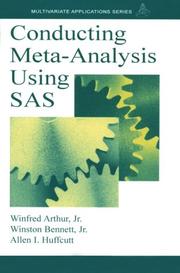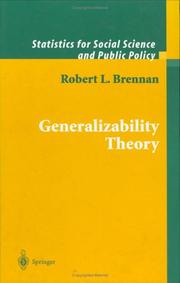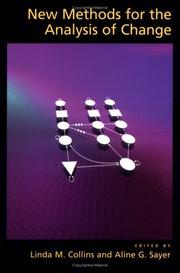| Listing 1 - 3 of 3 |
Sort by
|

ISBN: 0805839771 0805838090 Year: 2001 Publisher: Mahwah Erlbaum
Abstract | Keywords | Export | Availability | Bookmark
 Loading...
Loading...Choose an application
- Reference Manager
- EndNote
- RefWorks (Direct export to RefWorks)
Programming --- Quantitative methods in social research --- Mathematical statistics --- #SBIB:303H4 --- #PBIB:2001.4 --- Informatica in de sociale wetenschappen --- Meta-analysis. --- Psychology --- Psychometrics. --- Methoden en technieken --- Statistical methods. --- statistiek --- statistiek. --- Statistiek. --- Meta-analysis --- Psychometrics --- Measurement, Mental --- Measurement, Psychological --- Psychological measurement --- Psychological scaling --- Psychological statistics --- Psychometry (Psychophysics) --- Scaling, Psychological --- Psychological tests --- Scaling (Social sciences) --- Medicine --- Social sciences --- Statistical methods --- Measurement --- Scaling --- Methodology --- Research --- Evaluation

ISBN: 0387952829 144192938X 1475734565 9781441929389 Year: 2001 Publisher: New York : Springer,
Abstract | Keywords | Export | Availability | Bookmark
 Loading...
Loading...Choose an application
- Reference Manager
- EndNote
- RefWorks (Direct export to RefWorks)
In 1972 a monograph by Cronbach, Gleser, Nanda, and Rajaratnam was published entitled The Dependability of Behavioral Measurements. That book incorporated, systematized, and extended their previous research into what came to be called generalizability theory, which liberalizes classical test theory, in part through the application of analysis of variance proce dures that focus on variance components. Generalizability theory is perhaps the most broadly defined measurement model currently in existence, and the Cronbach et al. (1972) treatment of the theory represents a major con tribution to psychometrics. However, as Cronbach et al. (1972, p. 3) state, their book is "complexly organized and by no means simple to follow" and, of course, it is nearly 30 years old. In 1983, ACT, Inc. published my monograph entitled Elements of Gen eralizability Theory, with a slightly revised version appearing in 1992. That treatment is considerably less comprehensive than Cronbach et al. (1972) but still detailed enough to convey much ofthe richness of the theory and to facilitate its application. However, the 1983/1992 monograph is essen tially two decades old, it does not cover multivariate generalizability theory in depth, and it does not incorporate recent developments in statistics that bear upon the estimation of variance components. Also, of course, there have been numerous developments in generalizability theory in the last 20 years.
Mathematical statistics --- Analysis of variance. --- Psychology --- Psychometrics. --- Statistical methods. --- Statistics . --- Assessment. --- Statistics for Social Sciences, Humanities, Law. --- Assessment, Testing and Evaluation. --- Measurement, Mental --- Measurement, Psychological --- Psychological measurement --- Psychological scaling --- Psychological statistics --- Psychometry (Psychophysics) --- Scaling, Psychological --- Psychological tests --- Scaling (Social sciences) --- Statistical analysis --- Statistical data --- Statistical methods --- Statistical science --- Mathematics --- Econometrics --- Measurement --- Scaling --- Methodology --- Psychometrics --- Psychology - Statistical methods --- Analysis of variance

ISBN: 1557987548 Year: 2001 Publisher: [Place of publication not identified] American Psychological Association
Abstract | Keywords | Export | Availability | Bookmark
 Loading...
Loading...Choose an application
- Reference Manager
- EndNote
- RefWorks (Direct export to RefWorks)
Change (Psychology) --- Psychometrics. --- Social sciences --- Changement (Psychologie) --- Psychométrie --- Sciences sociales --- Methodology --- Méthodologie --- Psychometrics --- #SBIB:021.AANKOOP --- #SBIB:303H520 --- Measurement, Mental --- Measurement, Psychological --- Psychological measurement --- Psychological scaling --- Psychological statistics --- Psychology --- Psychometry (Psychophysics) --- Scaling, Psychological --- Psychological tests --- Scaling (Social sciences) --- Methoden sociale wetenschappen: techniek van de analyse, algemeen --- Measurement --- Scaling --- Psychométrie --- Méthodologie --- Quantitative methods in social research --- Social Sciences --- Statistique --- Mesure --- Méthode --- Variabilité comportementale --- Changement (psychologie) --- Psychométrie.
| Listing 1 - 3 of 3 |
Sort by
|

 Search
Search Feedback
Feedback About UniCat
About UniCat  Help
Help News
News